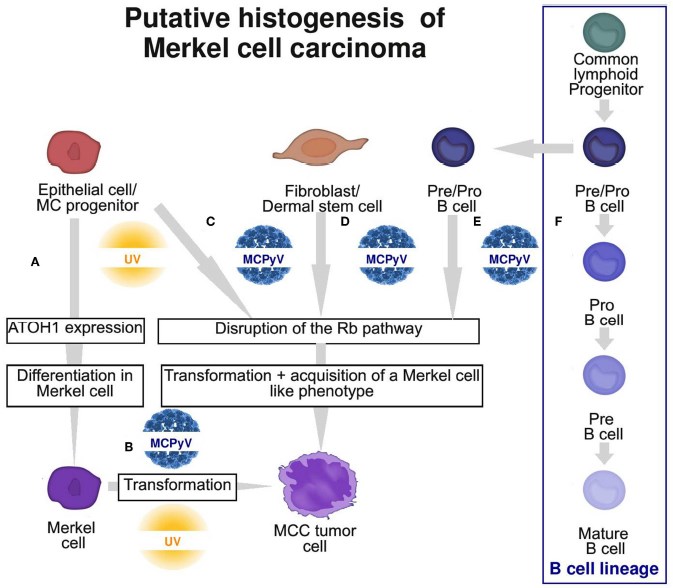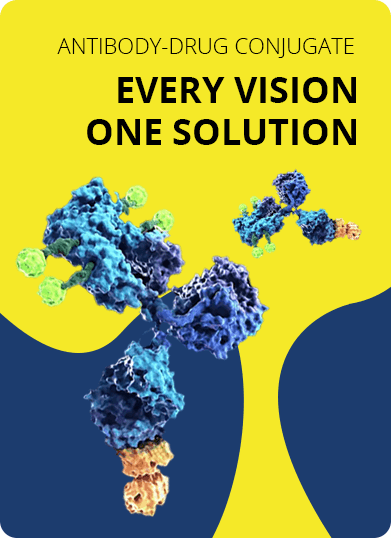- Home
- Applications
- Merkel-Cell Carcinoma
ADC Development Services for Merkel-Cell Carcinoma Research
Merkel cell carcinoma (MCC) is an aggressive neuroendocrine cutaneous cancer with a high incidence and mortality, especially in older patients. Traditional therapeutic strategies such as surgery and radiotherapy are primary therapies currently resulting in locoregional control to some degree. However, high failure rates highlight the need for new effective therapeutic options. Antibody-drug conjugates (ADCs) represent a promising and potential method for the treatment of recurrent MCC.
With years’ experience in the field of antibody development and bio-conjugation, Creative Biolabs is committed to offering innovative products and services to support the global drug discovery and development. At present, we provide outstanding ADCs design and construction services targeting a variety of diseases such as the Merkel-cell carcinoma. Our services range from antibody production to conjugates characterization, with comprehensive bio-conjugation and analysis platforms.
Introduction of Merkel-cell Carcinoma
Merkel-cell carcinoma (MCC) is a rare and aggressive cancer arising from skin. Most of the cancer cases are caused by the Merkel cell polyomavirus (MCPyV or MCV) and often occur in order people. The symptoms of MCC include a fast-growing tumor, painless nodule (tumor) on skin. MCC also appears on the face, head or neck and other areas. The research found that the main cause of cancer is the Merkel cell polyomavirus, but other risk factors still play a critical role in the development of this cancer. Risk factors commonly include excessive exposure to sunlight, a weakened immune system, having a history of other skin cancers, older age and light skin color. So far, the treatment approaches for MCC generally include surgery, radiation therapy, immunotherapy and chemotherapy.
 Fig.1 Graphic summary of the 4 putative cells of origin of Merkel cell carcinoma (MCC).1,2
Fig.1 Graphic summary of the 4 putative cells of origin of Merkel cell carcinoma (MCC).1,2
Current Therapeutic Strategies for Merkel-cell Carcinoma MCC
- MCC is an aggressive and fatal neuroendocrine cutaneous cancer, which tends to grow rapidly and metastasizes early. Thus, in addition to traditional treatment strategies (surgery, radiation therapy and chemotherapy), more effective and innovative treatment schemes need to be developed.
- Molecular-targeted agents are a kind of new therapy option. For example, pazopanib, a small-molecule tyrosine kinase inhibitor targets vascular-endothelial-growth-factor-receptors- (VEGFR-) 1, 2, and 3 and against platelet-derived-growth-factor-receptor- (PDGFR-) α and β. Pazopanib shows a promising antitumor and antiangiogenic function with good oral bioavailability. Imatinib mesylate is another tyrosine kinase inhibitor presenting promising therapeutic effect for MCC.
- Immunotherapeutic strategy as another novel therapy strategy is designed successfully. For example, the targeted therapy against viral T-antigens is a promising therapeutic option. Imiquimod is an immune inhibitor target the TLR7 (toll-like receptor-7) applied to the MCC treatment combined with the radiotherapy, which induces a significant antitumor immune response. Other immunotherapy agents have shown promising antitumor activity via blocking the programmed cell death (PD)-1/PD-L1 immune checkpoint, which is considered as standard care for metastatic MCC currently.
- ADC is another effective and potent therapeutic agent that has been developed actively. Lorvotuzumab mertansine (also known as IMGN901) is an ADC containing a humanized anti-CD56 antibody and a tubulin-binding maytansinoid DM1. This ADC has significant antitumor activity in CD56+ MCC tumors with favorable pharmacokinetics and manageable safety profile.
Target of ADC development for MCC:
At Creative Biolabs, we are committed to providing world-class ADCs development services targeting cancers such as the MCC. Our scientist team is able to promptly and effectively design and create optimal ADCs products for your drug discovery project. Please contact us for more information if you are interested in our services.
References
- Kervarrec, Thibault, et al. "Histogenesis of Merkel cell carcinoma: a comprehensive review." Frontiers in oncology 9 (2019): 451.
- Distributed under Open Access License CC BY 4.0, without modification.
For Research Use Only. NOT FOR CLINICAL USE.

Online Inquiry
Welcome! For price inquiries, please feel free to contact us through the form on the left side. We will get back to you as soon as possible.
